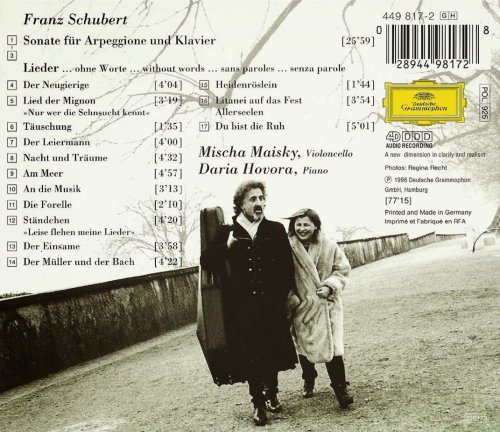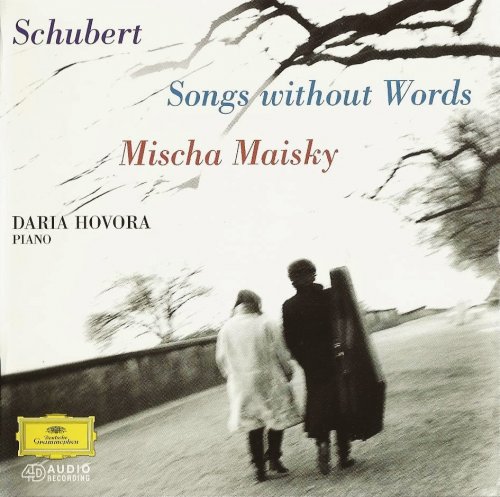
Mischa Maisky, Daria Hovora - Schubert: Songs without Words (1996)
BAND/ARTIST: Mischa Maisky, Daria Hovora
- Title: Schubert: Songs without Words
- Year Of Release: 1996
- Label: Deutsche Grammophon
- Genre: Classical
- Quality: FLAC (image+.cue,log,scans)
- Total Time: 01:17:15
- Total Size: 321 mb
- WebSite: Album Preview
Tracklist:
Franz Schubert (1797-1828)
01. Sonata for Arpeggione and Piano - 1. Allegro moderato [0:11:58.00]
02. Sonata for Arpeggione and Piano - 2. Adagio - [0:04:25.57]
03. Sonata for Arpeggione and Piano - 3. Allegretto [0:09:42.18]
04. Der Neugierige, D795 No.6 (from 'Die sch?e Mã?»lerin') [0:04:04.00]
05. Lied der Mignon "Nur wer die Sehnsucht kennt", D877 No.4 [0:03:19.00]
06. Tè?«schung, D911 No.19 (from 'Winterreise') [0:01:35.00]
07. Der Leiermann, D911 no.24 (from Winterreise') [0:04:00.00]
08. Nacht und Trè?«me, D827 [0:04:32.00]
09. Am Meer, D957 No.12 (from 'Schwanengesang') [0:04:57.00]
10. An die Musik, D547 [0:03:13.00]
11. Die Forelle, D550 [0:02:10.00]
12. Stè??dchen "Leise flehen meine Lieder", D957 No.4 (from 'Schwanengesang') [0:04:20.00]
13. Der Einsame, D800 [0:03:58.00]
14. Der Mã?»ler und der Bach, D795 No.19 (from 'Die Sch?e Mã?»lerin') [0:04:22.00]
15. Heider?lein, D257 [0:01:44.00]
16. Litanei auf das Fest Allerseelen, D343 [0:03:54.00]
17. Du bist die Ruh, D776 [0:05:01.00]
Performers:
Mischa Maisky - cello
Daria Hovora – piano

Franz Schubert (1797-1828)
01. Sonata for Arpeggione and Piano - 1. Allegro moderato [0:11:58.00]
02. Sonata for Arpeggione and Piano - 2. Adagio - [0:04:25.57]
03. Sonata for Arpeggione and Piano - 3. Allegretto [0:09:42.18]
04. Der Neugierige, D795 No.6 (from 'Die sch?e Mã?»lerin') [0:04:04.00]
05. Lied der Mignon "Nur wer die Sehnsucht kennt", D877 No.4 [0:03:19.00]
06. Tè?«schung, D911 No.19 (from 'Winterreise') [0:01:35.00]
07. Der Leiermann, D911 no.24 (from Winterreise') [0:04:00.00]
08. Nacht und Trè?«me, D827 [0:04:32.00]
09. Am Meer, D957 No.12 (from 'Schwanengesang') [0:04:57.00]
10. An die Musik, D547 [0:03:13.00]
11. Die Forelle, D550 [0:02:10.00]
12. Stè??dchen "Leise flehen meine Lieder", D957 No.4 (from 'Schwanengesang') [0:04:20.00]
13. Der Einsame, D800 [0:03:58.00]
14. Der Mã?»ler und der Bach, D795 No.19 (from 'Die Sch?e Mã?»lerin') [0:04:22.00]
15. Heider?lein, D257 [0:01:44.00]
16. Litanei auf das Fest Allerseelen, D343 [0:03:54.00]
17. Du bist die Ruh, D776 [0:05:01.00]
Performers:
Mischa Maisky - cello
Daria Hovora – piano
The paradox here is that the main item – or, rather, the longest work on the disc and the only one that isn’t a transcription of a song – is also among the least significant, musically speaking. Much as I adore the Arpeggione Sonata, even I couldn’t place it on the same exalted level of such Lieder masterpieces as Du bist die Ruh or Schwanengesang’s “Am Meer”. Great songs, yes – and yet by divorcing Schubert’s melodies from their texts, you lose the verbal imagery, the story-line (such as it is) and the prompting inspiration behind the tune. In fact, what you’re left with is elevated background music.
Maisky’s Arpeggione is warm, effortless and, for the most part, judiciously phrased. Daria Hovora remains discreetly in the background (as a musical personality, that is, not as a physical presence) and although I found some of the Allegretto’s rubato just a mite contrived, the performance is a good one. As to the songs, DG’s annotator Reinhard Beuth tells us that, in each case, “Maisky has simply dispensed with the poet’s strident and often disruptive voice and, not having to worry about the poem’s superficial, verbal contents, is able to group these songs together on purely musical lines”. ‘Strident’? ‘Disruptive’? Listen to Husch, Fischer-Dieskau, Erb, Schiotz, Hotter, Berger, Schumann or Lehmann – see what they can do with those ‘superficial, verbal contents’, Mr Beuth!
Most of the transcriptions are ruinously anodyne, although Maisky makes a lovely sound, especially in, say, An die Musik, where the cello’s upper registers project with great warmth of tone. Songs like Die Forelle and Heidenroslein sound cumbersome and uncomfortable; and as for “Der Leiermann”, “Am Meer”, “Standchen” and Du bist die Ruh, the absence of words is a crucial inadequacy. Had Maisky commanded the ‘speaking’ tone of a Casals, a Feuermann, a Fournier or a Marechal, perhaps the true meaning of each song would have registered, if only by dint of interpretative implication. The more overtly romantic Lieder of Brahms and Schumann might have responded better to such treatment (their melodies suit the cello rather more than those of Schubert), but most Schubert songs sound far better sung than played.
Maisky’s Arpeggione is warm, effortless and, for the most part, judiciously phrased. Daria Hovora remains discreetly in the background (as a musical personality, that is, not as a physical presence) and although I found some of the Allegretto’s rubato just a mite contrived, the performance is a good one. As to the songs, DG’s annotator Reinhard Beuth tells us that, in each case, “Maisky has simply dispensed with the poet’s strident and often disruptive voice and, not having to worry about the poem’s superficial, verbal contents, is able to group these songs together on purely musical lines”. ‘Strident’? ‘Disruptive’? Listen to Husch, Fischer-Dieskau, Erb, Schiotz, Hotter, Berger, Schumann or Lehmann – see what they can do with those ‘superficial, verbal contents’, Mr Beuth!
Most of the transcriptions are ruinously anodyne, although Maisky makes a lovely sound, especially in, say, An die Musik, where the cello’s upper registers project with great warmth of tone. Songs like Die Forelle and Heidenroslein sound cumbersome and uncomfortable; and as for “Der Leiermann”, “Am Meer”, “Standchen” and Du bist die Ruh, the absence of words is a crucial inadequacy. Had Maisky commanded the ‘speaking’ tone of a Casals, a Feuermann, a Fournier or a Marechal, perhaps the true meaning of each song would have registered, if only by dint of interpretative implication. The more overtly romantic Lieder of Brahms and Schumann might have responded better to such treatment (their melodies suit the cello rather more than those of Schubert), but most Schubert songs sound far better sung than played.

Classical | FLAC / APE | CD-Rip
As a ISRA.CLOUD's PREMIUM member you will have the following benefits:
- Unlimited high speed downloads
- Download directly without waiting time
- Unlimited parallel downloads
- Support for download accelerators
- No advertising
- Resume broken downloads


